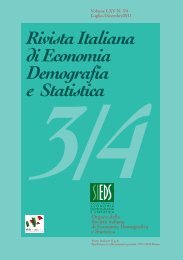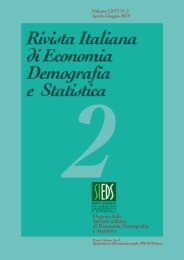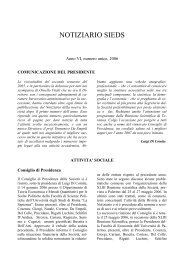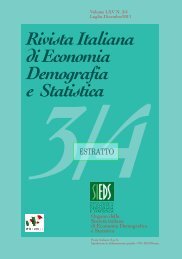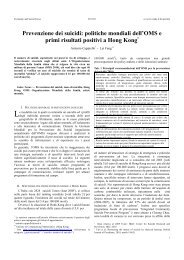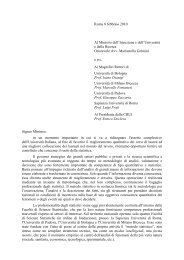rivista italiana di economia demografia e statistica - Sieds
rivista italiana di economia demografia e statistica - Sieds
rivista italiana di economia demografia e statistica - Sieds
Create successful ePaper yourself
Turn your PDF publications into a flip-book with our unique Google optimized e-Paper software.
Rivista Italiana <strong>di</strong> Economia Demografia e Statistica Volume LXIII nn. 3-4 – Luglio-Dicembre 2009<br />
THE EFFECTS OF IMPUTED RENT ON INCOME, POVERTY<br />
AND INEQUALITY IN FOUR EUROPEAN COUNTRIES<br />
Andrea Cutillo, Davide Di Laurea •<br />
1. Introduction<br />
The income position of in<strong>di</strong>viduals and households is determined by monetary<br />
earnings, but also influenced by non-monetary components and in-kind transfers. The<br />
inclusion of non-monetary earnings is recommended in international standards in order<br />
to improve the comparability of poverty and economic inequality of people living in<br />
<strong>di</strong>fferent situations. In this paper we focus on a particular type of non-cash income, the<br />
imputed rent (IR). Following the European Commission Regulation n. 1980/2003, “the<br />
imputed rent refers to the value that should be imputed to all the households that do not<br />
pay full rent for their main residence, i.e. a market price rent, either because they are<br />
owner-occupiers or they live in accommodation rented at lower price than the market<br />
price, or because their accommodation is provided rent-free”. There is a large<br />
agreement about the importance of integrating this component into income measures<br />
(ILO, 2003; Canberra Group, 2001). We focus on the <strong>di</strong>stributional impact of imputed<br />
rent in four European Countries: France, Italy, Spain and United Kingdom. Even if the<br />
attention on imputed rent has raised in the last years, little attention has been given to<br />
the international comparison (see, for instance, Frick et al. (2008)); in ad<strong>di</strong>tion there is<br />
not yet a standar<strong>di</strong>sed calculation method, as suggested by the Canberra Group (2001)<br />
and by Smee<strong>di</strong>ng and Weinberg (2001): “if net imputed rent is included in income, one<br />
must be careful that it is measured in a way that leads to greater international<br />
standar<strong>di</strong>zation instead of nation-specific measures of its value”. We use Eu-Silc<br />
(European Community Statistics on Income and Living Con<strong>di</strong>tions) 2006 microdata:<br />
this survey is harmonized across Countries, and this enables us to homogeneously<br />
estimate imputed rent and compare the results.<br />
2. Estimation methods<br />
The IR must be included for all households that do not report paying full rent: those<br />
living in owned dwellings and households living in accommodation rented at a lower<br />
• This note, though is the result of a close collaboration, was specifically elaborated as<br />
follows: par. 1, 2 and 4 by A. Cutillo; par. 3 and 5 by D. Di Laurea



